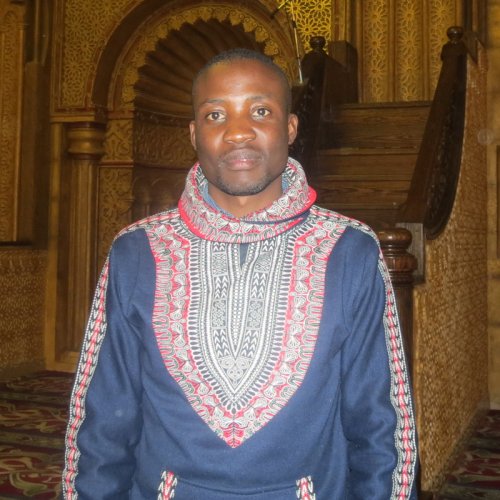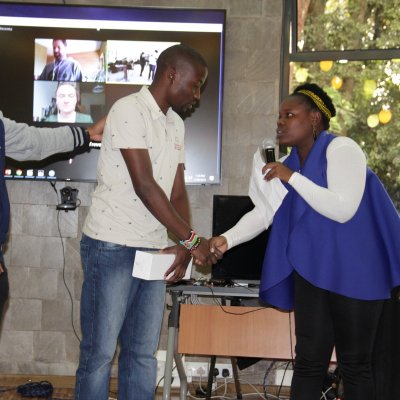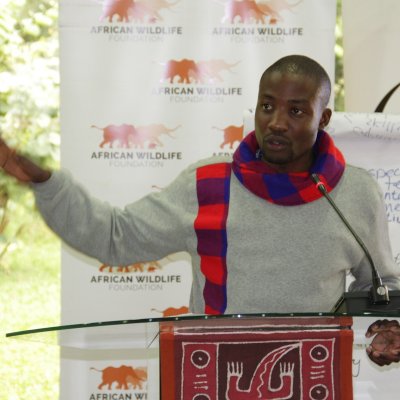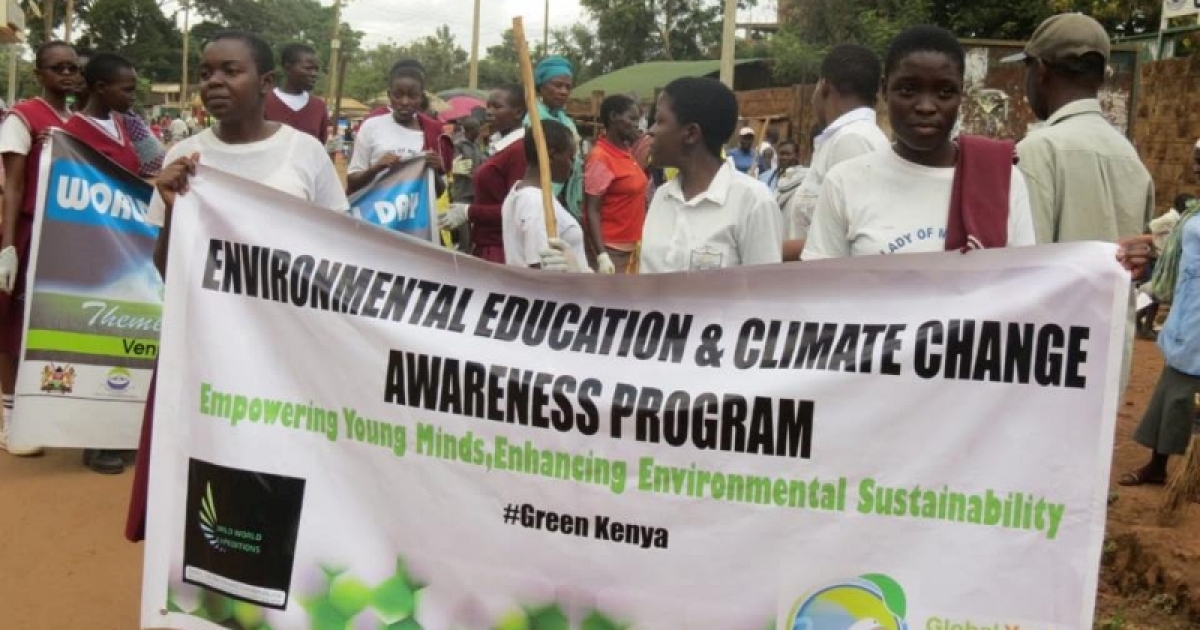“Choose a Struggle and Work Your Way Up”
Kevin is a passionate wildlife biologist, certified Environmental Impact Assessment and Audit Expert, tour operator, and Climate Change Mitigation Specialist. Kevin has three years experience in civic education and youth capacity building on environmental conservation and climate change mitigation. He earned his Bachelor’s degree in Wildlife Conservation and Enterprise Management from Egerton University. While volunteering as the Program coordinator at Amani Kibera, a community-based organization that focuses on peace and conflict resolution through active non-violence and education, he co-founded Wild World Expeditions. Wild World Expeditions is a youth-led initiative that provides hopes to change perceptions and enhance environmental conservation through advocacy and provision of sustainable and innovative ecotourism and farming models.
Q: Tell us a few things about your country, and also your life's story!
A: I come from Kenya, one of the countries in East Africa, with a beautiful coastline of the Indian Ocean. The country is largely agrarian, with a great percentage (about 30%) of the Gross Domestic Product (GDP) coming from agriculture. Over 70% of the population is directly or indirectly employed in the agricultural sector.
Due to our amazing climate and biodiversity, we also reap hugely from tourism. However, being a sub-Saharan country in Africa, we still face a number of economic, environmental, and socio-cultural, challenges. I was born and raised in Busia, a town close to the border of Kenya and Uganda. Being a first born in a family with strong Christian values instilled some of the virtues that have provided a fundamental basis in my life. While growing up, I realized the need to curb the loss of biodiversity that was quickly dwindling in my village and the country at large. I could, for instance, notice how the percentage of forest cover in Kenya was drastically reducing. This is why I chose to be an ecologist. After completing my bachelors in Wildlife Conservation, I did a post-graduate on environmental impact assessment and audit. It is after university (in 2015) that I started writing on environmental issues through my blog (Kelvin's Wild Chronicles), which has so far been nominated three times for various awards, including the 2019 BAKE (Bloggers Association of Kenya) Awards. In 2016, I founded Wild World Expeditions, an Eco-tour travel agency that seeks to change the perceptions of travel to include environmental conservation and cultural preservation. This was also the year that I won an award as the young male environmentalist of the Year, under the community work category of the Environment254 Awards. In 2017, we (with a friend) started the Kenyan chapter of the Global Youth Biodiversity Network. This is a platform for engagement by young people who are committed to halting biodiversity loss in Kenya. Since August 2017, the network has grown to over 3000 members from across the country and is now one of the most active conservation youth societies in Kenya. We focus on youth capacity-building, inclusion of youth voices in conservation policy, awareness and education, and climate-smart agriculture. In 2018, I was selected as an environmental ambassador with CoalitionWILD, an international network of young people working on environmental issues. In 2019, I have been selected as one of the judges of Young Champions of the World, a project of the United Nations Environmental Programme. I envision a world where youth-centered actions, innovation and voices will be prioritized to provide viable solutions to nature conservation challenges.
Q: What is your view of the world as it is today? And how do you define the concept of a better world?
A: The world is today at a defining moment - whatever decisions and actions we take today will largely determine what happens next. Major global assessments on biodiversity, for instance, including the recent report by The Intergovernmental Science-Policy Platform on Biodiversity and Ecosystem Services (IPBES) of the United Nations have pointed to the "crisis" situation that the world is in. Human beings have largely contributed to the loss of biodiversity, with over one million plant and animal species at the risk of extinction. Radical and bold measures are, therefore, needed to reverse this trend. In Africa, where I come from, pressure from population growth and land use is resulting in huge loss of natural resources. A better world to me is then that which guarantees the future of itself- a world where prudent policies, collaborative efforts, and local communities are recognized as key players in conservation.
Q: As a young individual what are a few of the hurdles that you had to overcome up until today?
A: My biggest hurdle has been to believe in a course that never seemed "lucrative" in a society where many people would rather be doctors and pilots when they grow up. The conservation space is one of the most underpinned sectors in Kenya, with not only a few resources but also institutions to offer employment and support. However, this is promising to change as many people are now seeing the need to have solid conservation frameworks, thanks to the devastating effects of climate change that are being felt by everyone. A policy that favours conservation of the environment, wildlife and a shift to cleaner energy alternatives has also been put in place. More young people are also seeing the need to pursue conservation courses. I hope that in the coming years, Kenya will have resource centers dedicated to environmental education and institutions that recognize and defend the rights of environmental activists. It is also a time that we mainstreamed biodiversity into all the major sectors in Kenya, in order for us to realize sustainable development.
Q: Why is the role of a mentor important for you?
A: I truly value the role of a mentor in providing the much-needed skills, insights from experience, and guidance on professional development.
Q: Do you have a lesson that life has taught you and you would like to share?
A: Yes. Life has taught me that dreams do not work unless you work on them. Most of the things I have achieved so far in life are as a result of constant hard work, dedication, and discipline. You have to make a deliberate decision on where you want to head in life, and create a road-map for reaching there. One of the most vital components of this road-map is getting a mentor to guide you through and hold your hand. Choose a struggle and work your way up.
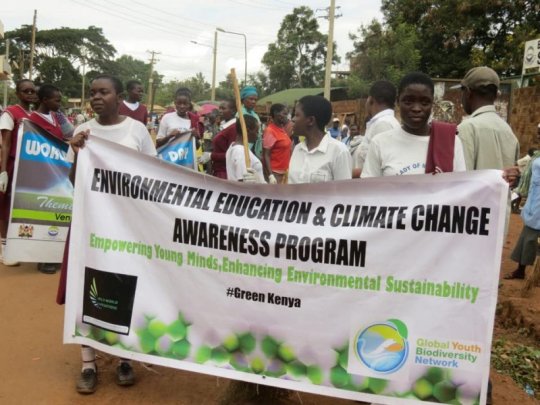
Q: Name a project, a foundation or a person in your country that you think is doing great work in helping improve other people's lives!
A: The Kenyan Youth Biodiversity Network. This amazing group of young people is doing incredible work empowering youth and the community at large on biodiversity conservation and policy advocacy. The network also shares internship and job openings through its social platforms. They are not only dedicated to improving well-being through nature conservation but also socio-economic growth.
Q: What are some of the challenges that women in your country face and what efforts are made towards gender equality?
A: Gender-based violence and discrimination, sexual harassment, female genital mutilation and early marriages.
Q: Athena40 is the first ever global selection of the top 40 women forward thinkers, commentators, activists, authors, academics, entrepreneurs, executives, innovators. Can you think of a truly innovative and forward-thinking woman from your country that you wish to nominate for the Athena40 global list?
A: Yes. Ms. Maryanne Muriuki.


